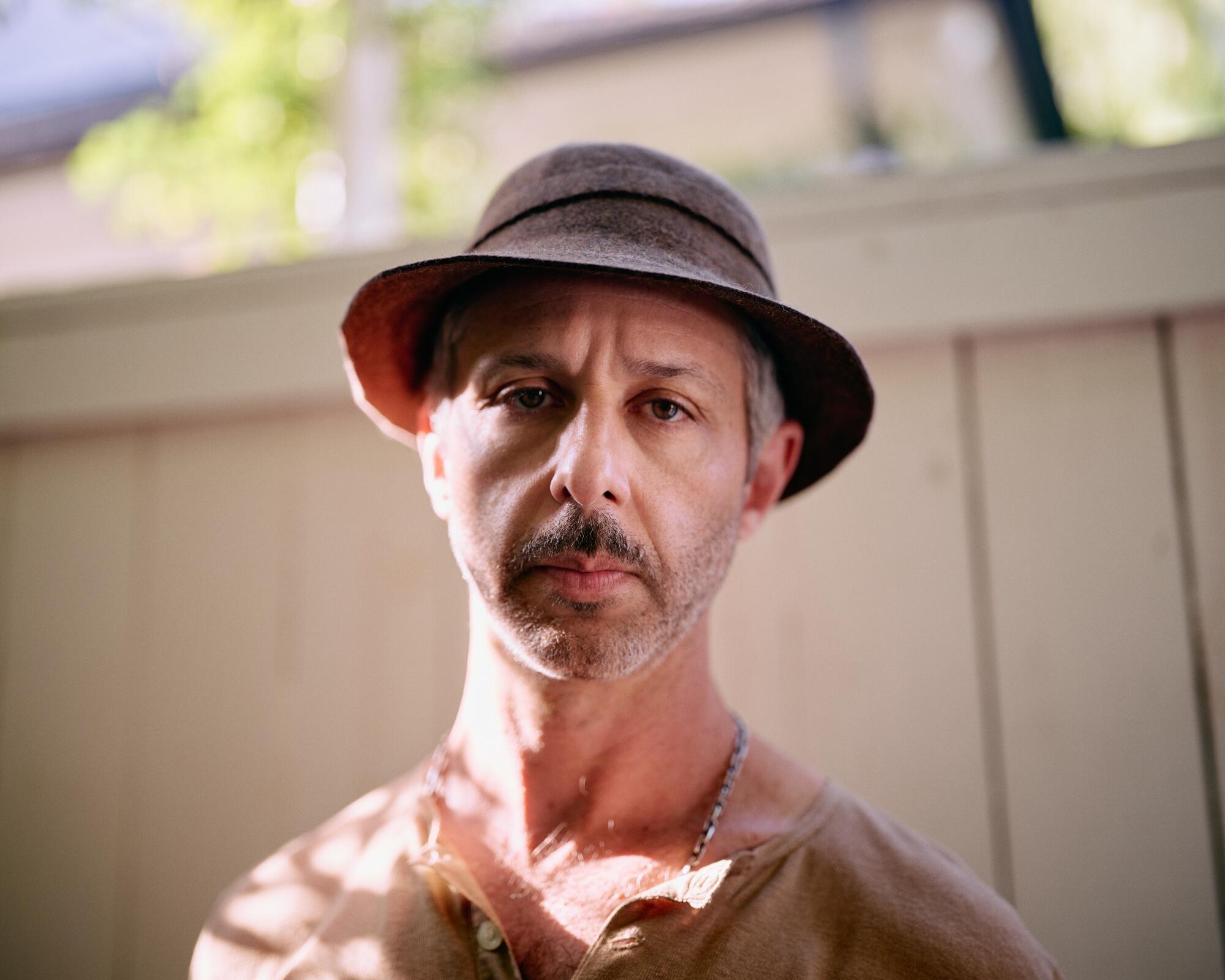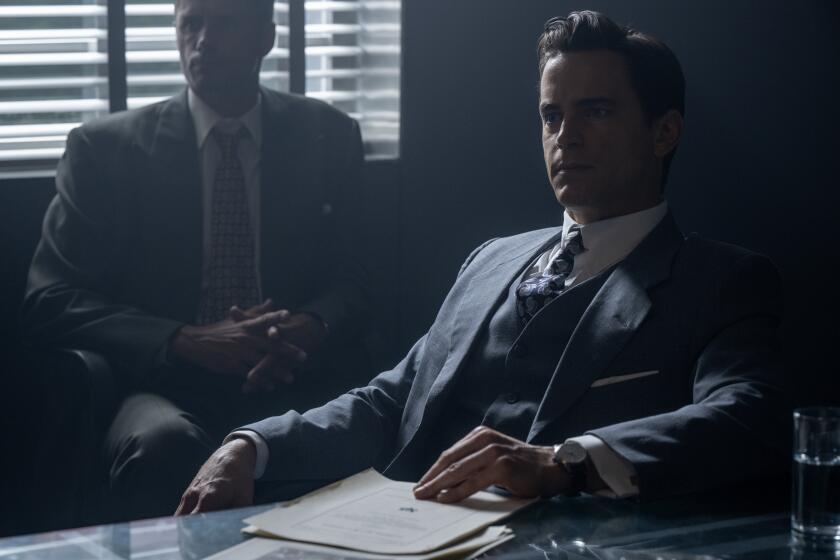
- Share via
Brutal. Vicious. Crooked. Cruel.
So filmmaker Ali Abbasi’s new biopic “The Apprentice” describes its dominant figure, a New York and Washington, D.C., power broker who lies, cheats, charms and browbeats his way into the uppermost ranks of American business and government.
No, it’s not Donald Trump. It’s Roy Cohn.
As the film depicts with garish flair, the pugilistic, Bronx-born attorney — who first came to prominence prosecuting Julius and Ethel Rosenberg for espionage, then served as chief counsel to Sen. Joseph McCarthy during his anticommunist witch hunt — took Trump under his wing in the 1970s, handing the ambitious real-estate developer’s son a fiendish playbook for success. Attack, attack, attack. Deny everything. Never admit defeat. By the time of his disbarment and death from AIDS complications in 1986, however, the roles were reversed, and Cohn lost sway with his erstwhile mentee as Trump stepped out of his shadow.
Throughout “The Apprentice,” Cohn comes across not only with his renowned ferocity, but also with uncommon empathy, courtesy of actor Jeremy Strong.
With ‘Will & Harper,’ the ‘SNL’ star and his friend Harper Steele face a new twist on an old challenge in LGBTQ+ representation: How to educate cis viewers without alienating trans ones.
“If Roy Cohn walked into this room right now, I don’t think I would want to shake his hand,” says Strong, 45, seated in a bar off the sun-dappled courtyard of the San Vicente Bungalows on an early fall afternoon. “But from the distance of a piece of work and trying to understand him — humanistically and creatively — I had to find, for lack of a better word, love. Which is a bit of a grenade to say out loud.”
Fresh off a silent meditation retreat in upstate New York, the “Succession” star folds the same circumspection into nearly all of his stacked, erudite sentences, which are peppered with literary allusions (Kafka’s “The Zürau Aphorisms”) and film-industry names (Danish director Tobias Lindholm). At times Strong pauses so long that I launch into my next question, only to be interrupted by the continuation of an apparently unfinished thought. He denies being “gun shy” about press since the publication of a viral 2021 New Yorker profile in which a number of his collaborators — some named, others anonymous — looked askance at the lengths to which he’ll go to embed himself in a character.
“I think I’m a fairly earnest person, and that’s gotten me in trouble,” Strong insists, “but I’m not interested in camouflaging or disguising myself. Life is too short.”

The topic at hand isn’t just the life and times of Roy Cohn, of course. When “The Apprentice” premiered earlier this year at the Cannes Film Festival, the Trump campaign swiftly threatened a lawsuit, calling the film “pure malicious defamation” and suggesting it “should not see the light of day.” Then, as if the former president’s wish had come true, the project languished for months without a distributor. Despite repeated reassurances from Abbasi, Strong, writer Gabriel Sherman and actor Sebastian Stan, who plays Trump, that “The Apprentice” was not a political polemic but a character study, it seemed plausible, as recently as August, that the film would remain on the shelf until after next month’s election, if not indefinitely. (It was ultimately picked up by Briarcliff Entertainment.)
“We sort of narrowly escaped the jaws of being effectively censored in this country,” Strong says. “That’s something that happens in Russia, North Korea. Not democratic countries. I think people in Hollywood were really wary of touching this, and that was disheartening.”
In theaters Friday, “The Apprentice” arrives in the home stretch of a bruising, chaotic presidential election campaign, sure to be scrutinized as closely as any film of the fall. Supporters of the Republican nominee will likely follow the Trump camp’s lead in calling the movie — in which Trump rapes first wife Ivana (Maria Bakalova) and undergoes multiple cosmetic surgeries — a hit piece, while his most ardent opponents may see any attempt to humanize Trump or Cohn as beyond the pale.
Given the fraught political environment, Strong strains to frame his approach to the character as a historian might, decoupling understanding from endorsement. Although he uses words like empathy, kinship and love to explain how he got under Cohn’s skin, he also describes the attorney as a “cancerous conundrum” and a “demonic Peter Pan.”
“God, it’s really dangerous,” Strong says. “I feel like I could get in trouble for saying anything positive about him. When I say these things, I only really mean them in a creative arena, because creatively a character like Roy is like Iago. You don’t want to say anything nice about Iago. But as an actor, Iago is one of the great roles. This feels like one of the great roles.”
Strong is not alone in his estimation. As a key character in Tony Kushner’s Pulitzer-winning 1991 play “Angels in America,” Mike Nichols’ 2003 HBO miniseries adaptation thereof, the 1992 TV movie “Citizen Cohn,” last year’s miniseries “Fellow Travelers” and numerous documentaries, Cohn has inspired more major films and TV series than even Harvey Milk. His many portrayals have resulted in two Tonys, an Emmy and a Peabody. I ask Strong if he thinks there’s any merit to the criticism about straight actors playing gay characters, and receiving acclaim for doing so, when such opportunities and plaudits remain a rarity for out gay actors.
In Showtime’s McCarthy-era drama ‘Fellow Travelers,’ silence is the sharpest of double-edged swords: What ensures survival in one regime equals death in another.
“Yes, it’s absolutely valid,” Strong says. “I’m sort of old fashioned, maybe, in the belief that, fundamentally, it’s [about] a person’s artistry, and that great artists, historically, have been able to, as it were, change the stamp of their nature. That’s your job as an actor. The task, in a way, is to render something that is not necessarily your native habitat. ... While I don’t think that it’s necessary [for gay roles to be played by gay performers], I think that it would be good if that were given more weight.”
Then, as I begin to follow up, he interjects, “What do you think?”
I think it’s complicated, if I’m being honest. I think it might be passé of me even to ask about it. At least for cis, white gay men, who have consistently dominated LGBTQ+ representation in film and television, the flagrantly stereotypical performances — the ones that treat the character’s sexuality as if it were another layer of hair, makeup or wardrobe — are now few and far between. It’s hard to muster one’s revolutionary fervor for Cohn, the man the “Bad Gays” podcast once labeled “the polestar of human evil.”
And yet that is exactly what makes this real-life character — a closeted, self-hating homosexual who helped launch the Lavender Scare and remained silent about the AIDS crisis even as it killed him — an ideal test case. The fact remains that no out gay man has ever won an Oscar for playing a queer character in the 96-year history of the Academy Awards. Meanwhile, this season alone could conceivably add two more names — Strong and Daniel Craig for “Queer” — to the list of nine straight men who’ve previously done so. (The numbers for women, and nominations, are scarcely any better.) In light of the disproportion, one can’t help but draw the conclusion that pundits and voters still understand playing gay as one mark in the column for “outstanding performance.” Which raises the question: Might a gay actor get more credit if he opted to play our community’s most notorious supervillain, instead of another tragic hero we’re determined to uplift? Would that appear, to the film academy’s approximately 10,000 members, a little more like “acting,” and less like life?
Compared with Pacino’s outraged and outrageous Cohn, spraying a vulgarian’s spittle across Nichols’ magisterial “Angels,” Strong’s performance is a model of white-knuckle control, swaggering when Cohn exerts his power, wilting when he can’t. When Cohn learns that Trump has gifted him fake-diamond cuff links for what will turn out to be his final birthday, Strong invests the petty indignity with pathos, as a man who would step over anyone to get ahead realizes he’s subject to the same ruthless forces. Along with Will Brill’s turn in “Fellow Travelers,” painting Cohn as practically lovesick for his partner in anticommunism, G. David Schine, “The Apprentice” is the closest any screen actor has come to reflecting the description of the attorney on the AIDS Memorial Quilt: “Bully. Coward. Victim.”
“What I do feel, whoever plays any part ever, is that you have to take these things as seriously as you take your own life, and it is not a game, and that these people and their struggles and the experiences you’re trying to render are not a plaything,” Strong says. “If I didn’t believe that I could understand on some deep level his anguish and turmoil and his need, and the sort of Gordian knot that every character has but Roy has particularly — if I didn’t believe that I could understand it or connect to it in a way that is faithful or voracious, I wouldn’t have done it. I certainly don’t do these things just for my own self-aggrandizement.”

Strong has become an almost scholarly fount of biographical information about Cohn, littering our conversation with enough details about the man’s home decor (porcelain frog figurines), taste in poetry (Joaquin Miller’s “Byron”) and dinner order at Le Cirque (Bumble Bee tuna, off-menu) to give Cohn‘s biographers a run for their money.
When Abbasi offered the role to Strong, the actor was already familiar with Cohn, not only from “Angels in America,” but also from the research he did after being approached to play Cohn in another film project about five years ago. Signing on to “The Apprentice” sent Strong’s prep work into overdrive, including studying video of Cohn to learn his “sui generis” voice — a hectoring New York sneer that’s authoritative but rarely loud — and interviewing Cohn profiler Ken Auletta. Strong says Cohn also represents his most dramatic physical transformation.
“I haven’t had to alter my body in that way,” says Strong, who underwent a doctor-supervised “starvation diet” and a regimen of tanning booth visits and biweekly spray tans to match Cohn’s notoriously leathery look. “He was obsessed with his physical appearance. He had a tremendous amount of vanity.”
Sebastian Stan, Jeremy Strong and director Ali Abbasi dive into their controversial biopic and the stakes as it hits theaters just before the presidential election.
With an Emmy for “Succession” and a Tony for this spring’s revival of Henrik Ibsen’s “Enemy of the People” under his belt, and Oscar buzz for his performance in “The Apprentice” already building, Strong’s own motivations are evolving. While career disappointment once spurred him, he is now just “looking for a limb to go out on.” I liken it, during the course of our conversation, to gymnast Simone Biles developing never-before-attempted vaults to challenge herself.
“I no longer feel thwarted in that way and I can pay my rent,” Strong says. “And I don’t take any of that for granted because it happened late for me. I have the luxury of choice and the luxury, more importantly, of getting to choose things that matter most to me, things that feel meaningful. I want to keep pushing myself — that Simone Biles thing of finding new ways to find the frontier and work that kind of requires a radical courage to do. Which for me is most things, because I find it all pretty fearful.”
After we’ve parted ways, Strong texts me a quote by Bruce Springsteen — “The pressures of the business are powerless in the face of what is real” — from music journalist Fred Goodman’s history “The Mansion on the Hill,” which Strong is reading to prepare to play Springsteen manager Jon Landau in the upcoming biopic starring Jeremy Allen White. I, too, am a collector of quotations, and after joking that newspaper stories should have epigraphs, I suggest one, from Wallace Stegner, that seems apropos to our conversation about Cohn: Present your subject in his own terms, judge him in yours.
“That’s a good one,” Strong texts. “For actors too.”
More to Read
Only good movies
Get the Indie Focus newsletter, Mark Olsen's weekly guide to the world of cinema.
You may occasionally receive promotional content from the Los Angeles Times.














